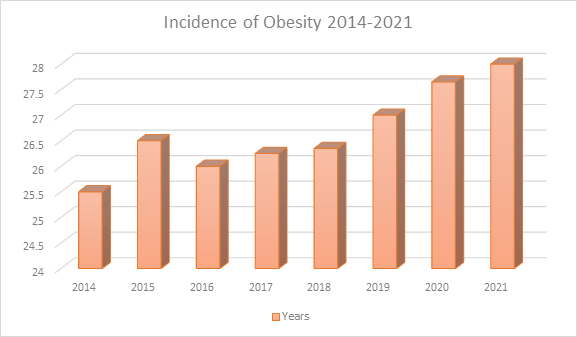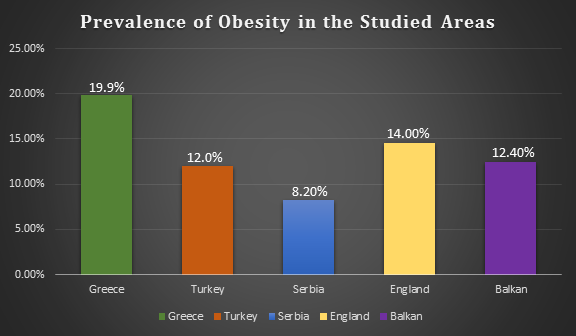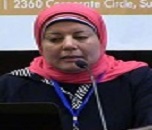Theme: Making Healthy Choices: Fighting Obesity a Perplexity Problem
Obesity Middle East 2019
Following the success of the previous conferences, we are honored to announce that “2nd Middle East Obesity, Bariatric Surgery and Endocrinology Congress” will be held during May 30-31, 2019 in the beautiful Istanbul, Turkey, with a theme of “Making Healthy Choices: Fighting Obesity a Perplexity Problem”. The Conference incorporates Obesity Symposiums, Obesity Workshops, Endocrinology workshops, Oral, Exhibitions and Poster introductions. Obesity and Endocrinology Conference 2019 is a worldwide stage to talk about and find out about Childhood Obesity, Weight Management, Obesity and Nutrition, Obesity Medicine, Endocrinology, Bariatric Surgery, Obesity and CVS, Diabetes, Pediatric Endocrinology and the field of Obesity. The two days of Obesity conference contributes active and healthy discussions on recent advancements and new strategies for the development of new materials for global requirements.
Obesity Middle East 2019 is anticipating participants from 40 and more countries across the globe and gathering highly interactive and informative sessions to strengthen the exchange of ideas across a wide range of disciplines in the field of Obesity, Bariatric Surgery and Endocrinology. The two days conference will provoke keynote speeches, plenary sessions, oral and poster presentations.
Target Audience:
- Obesity Specialists
- Dieticians
- Endocrinologists
- Bariatric Surgeons
- Obesity & Endocrinology Associations and Societies
- Basic Clinical Research Scientists & Students
- Yoga & Fitness Professionals
- Cardiologists
- Diabetologists
- Medical Colleges
- Nutritionists
- Physical Therapists
- Students
- Business Entrepreneurs
- Industry Professionals
- Health Promoters
- Public Health Professionals
- Fitness Professionals
Track: Obesity and Its Causes
Obesity is a chronic condition in which the accumulation of excess body fat has been takes place. It is calculated by the body mass index (BMI). Body mass index over 30 is considered as obese people. Obesity increases the risk of heart disease which can be lead to heart disease, to high blood pressure, diabetes, cancer, gallstones, and other chronic diseases. Obesity has linked to increased risk for a number of cancers. The most common causes of obesity is a combination of excessive food intake, lack of physical activity, and genetic susceptibility. Exercises associated with the treatment of weight are changes in eating regimen and physical working out. The main reason for obesity is when people regularly eat more calories than they burn. An absence of physical activity and sleep are the reasons for obesity. Body weight is the result of a combination of influences behavioral, genetic, metabolic, ecological, socio-economical influences. Obesity Congress assembles a highly informative and interactive session in the field of Obesity, Bariatric Surgery, and Endocrinology
Track: Childhood Obesity and Effects
Childhood obesity is one of the most adverse therapeutic conditions that is influencing children and adolescents. Nowadays most of the children are suffering from obesity. Due to genetical reasons, many obese children become obese adults, especially if one or both parents are obese. The early physical impacts of obesity in adolescence incorporate, the greater part of the child’s organs being influenced, apnoea, hepatitis, gallstones and expanded intracranial pressure. Childhood obesity can also result in serious conditions including diabetes, rest issues, malignancy, and different disorders like liver diseases, hypertension, coronary illness, early adolescence, dietary problems, for example, bulimia and anorexia, skin contaminations, asthma and other respiratory issues. Obesity can be diminished by doing Physical action. Proposals from the experienced metabolic and Bariatric Surgeons, enrolled dieticians, advertisers helps in the decrease of youth diabetes.
Track: Obesity during Pregnancy
Health of the mother and child can be affected by obesity during pregnancy. It is very harmful gaining too much weight during pregnancy or being overweight or obese, is also risky for the mother and child. Obesity during pregnancy increases the risk of various pregnancy complications, Such as Infection, Preeclampsia, Gestational Diabetes, and Pregnancy Loss. Higher rates of childhood obesity and childhood metabolic syndrome can be seen in the children born to overweight or obese mothers. Reducing body weight is the best way before one become pregnant to decrease the risk of problems caused by obesity. When compared with women of normal weight Obese women have an increased risk of miscarriage chances. Babies born to obese women have an increased risk of having birth defects, such as neural tube defects and heart defects. Syndrome called Macrosomia—in this syndrome, the child is larger than average. This can increase the risk of the child being injured during birth. Macrosomia also increases the risk of cesarean delivery. Infants born with an excess amount of body fat have a greater chance of being obese later in life. Weight loss before becoming pregnant is the best way to reduce the risk of problems caused by obesity. Obesity Conferences focus on policy and environmental strategies to make healthy eating and active living accessible and affordable for everyone.
Track: Obesity and Cognitive Function
Obesity is thought to affect both the central nervous system and the peripheral nervous system. Obesity appears to negatively affect the central nervous system, particularly cognitive function. There is a meer association between obesity and dementia, including Alzheimer’s disease. Obesity has been shown to double the risk of Alzheimer’s disease and a high body mass index (BMI) is linked to an enhanced risk of dementia. mild cognitive impairment can be seen in individuals with severe obesity. Negative effects of obesity on the Peripheral Nervous System (PNS) include polyneuropathy and autonomic dysfunction. Polyneuropathy is defined as sensory loss, typically starting with the feet and finally affecting the hands. One of the most common causes of polyneuropathy is type 2 diabetes. Dietary modifications and exercise have proven effective at improving metabolic and cognitive function of obesity patients.
Track: Genetics of Obesity
Obesity is very heritable. Obesity can be a complicating disorder which results from the interactions of a wide variety of hereditary and environmental factors. Polymorphisms in various genes controlling appetite and metabolism make susceptible to obesity under certain dietary conditions. The melanocortin 4 receptor gene mutation may be responsible for tens of thousands of cases of obesity. Monogenic type of genetic mutation is mainly responsible for severe forms of obesity that run in families. Occurrences of monogenic kinds of overweight are evidence that obesity may be caused by genetic mutations are mainly responsible for the occurrence of monogenic kinds of overweight. The most common forms of obesity are probably the result of variations in a large number of genes. The Obesity Meeting 2019 highlights the evolving strategies for obesity, weight loss-management, childhood obesity, exercise, physical therapy, bariatric surgery and upcoming challenges in the field of medicine & healthcare.
Track: Obesity and Cardiovascular Disease
Obesity is one of the first and foremost risk factors for cardiovascular disease. The major effects of obesity on cardiovascular (CV) health are mediated through the risk of metabolic syndrome (dyslipidemia, and hypertension and insulin resistance), such that an absence of these risk factors in obese individuals may not be associated with increased mortality risk. Obesity is corresponding with an increased risk of morbidity and mortality as well as reduced life and expectancy. Men are more prone to develop visceral type obesity while women develop the peripheral type. Corticosteroids and growth hormone also reason to develop visceral obesity. Obesity Congress gathers a highly interactive and informative session in the field of Bariatric Surgery, Obesity and Endocrinology.
Track: Obesity and Nutrition
Eating excessive fat-containing foods and lack of nutritional intake are the most common causes of obesity and overweight. Good nutrition, physical activity, and healthy body weight are important parts of a person’s overall health and well-being. Together, these can help decrease a person’s risk of developing serious health conditions, such as high blood pressure, high cholesterol, diabetes, stroke, heart disease and cancer. A controlled diet, regular physical activity, and achieving and maintaining a healthy weight also are paramount to managing health conditions so they do not worsen over time. Nutritional Conferences interprets the interaction of nutrients and other substances in food in relation to maintenance, health, and disease condition of an organism.
Track: Obesity and Diabetes
Obesity is one of the most common risk factors for developing Diabetes Mellitus 2. Both being overweight with enhanced abdominal fat and being obese is thought to contribute about 80 to 90 percent of all Diabetes Mellitus 2 development. Women with a Body Mass Index of 23 to 25 have a four-fold higher risk of type 2 diabetes than those with a BMI less than 20. Without the intercession of a healthy diet and proper exercise, obesity can lead to type 2 diabetes over a generally short period of time. The good news is that decreasing your body weight, by even a small amount, can help improve your body's insulin sensitivity and reduce your risk of developing cardiovascular and metabolic conditions such as heart disease, type2 diabetes and types of cancer. Obesity Conferences focus on policy and environmental strategies to make healthy eating and active living accessible and affordable for everyone.
Track: Weight Management
The optimal diet for prevention of weight gain, metabolic syndrome, obesity and type 2 diabetes is fiber-rich, fat-reduced, high in low-energy density carbohydrates (fruit, vegetables, and whole grain products), and intake of energy-containing drinks is restricted. Weight management emphasizes the importance of healthy eating patterns that include a variety of nutrient-dense foods, limit portions of energy-dense foods, and reduce overall energy density. Weight loss is achieved by a negative energy balance. This, in turn, is attained in most by the reduction in calorie intake rather than an increase in physical activity. Nutritional Conferences interprets the interaction of nutrients and other substances in food in relation to maintenance, health, and disease of an organism.
Track: Health, Behaviour & Environment
A combination of suitable nutrient-rich diet and more physical activity is preferred, but an energy controlled diet is recommended for overweight or obese adults who wish to lose weight. Many diseases can be reduced by doing regular physical activity, at the same time helps in controlling weight and strengthens muscles, bones, and joints. Now a day’s people are dependent on high fat and calorie, unusually attractive and modest sustenance. Behavior is one of the elements affecting weight pick up. Learned practices like using edibles to express love, eating by overlooking body signals prompt weight. The Obesity Meeting 2019 highlights the evolving strategies for obesity, weight loss-management, childhood obesity, exercise, physical therapy, bariatric surgery and upcoming challenges in the field of medicine & healthcare.
Track: Yoga and Neuropathy
Yoga and Neuropathy give a healthy approach to the treatment of obesity and comprehensive well-being. By practicing yoga and naturopathy, it is easy to lose weight and maintain a healthy lifestyle, beneficial for physical and mental health. Yoga postures like Asanas, Meditation and Pranayama relaxation strategies are useful for weight reduction, decreasing of muscle versus fat and weight management. Shedding of overabundance fat and gaining a perfect body can be accomplished by honing yoga. Naturopathy serves food as medicine and diet is an integral part of naturopathic treatments. Naturopathy furnishes a good diet and way of life counsel alongside a treatment timetable to reduce weight and tone up the body. Obesity Meetings gets driving and experienced Metabolic and Registered Dieticians and Diabetes Educators, Bariatric Surgeons, Fitness Professionals and Health Promoters and some more.
Track: Advanced Treatment for Obesity
Specialists like dieticians, direct counsel or a bulkiness power to appreciate and take off enhancements in eating and activity penchants. All weight programs recommend changes in eating disorders and extended physical activity. The treatment systems that are right depends on the endless supply of heaviness, general prosperity and capability of an individual to understand weight lessening masterminds. Obesity Congress gathers a highly interactive and informative session in the field of Obesity, Bariatric Surgery, and Endocrinology.
Track: Bariatric Therapy
Bariatric surgery is an operation that is performed keeping in mind the end goal to enable such people to get in shape. Bariatric surgery is to confine sustenance admission and diminishing the retention of nourishment in the stomach and digestion tracts. There are different sorts of bariatric surgeries that can be performed are Flexible Gastric Banding (AGB), Roux-en-Y Gastric sidestep (RYGB), Biliopancreatic redirection with a Duodenal Switch (BPD-DS) and Vertical Sleeve gastrectomy (VSG). Obesity Meetings gets driving and experienced Metabolic and Bariatric Surgeons, Registered Dieticians and Diabetes Educators, Fitness Professionals and Health Promoters and some more.
Track: Bariatric Surgery in Infertility
An obese woman is about thrice as liable to be infertile as a normal woman. The obese woman has a lower possibility of pregnancy as well as has brought down the shot following in vitro treatment. They require higher amounts of gonadotropins and have an expanded unsuccessful labor rate. Whenever possible, pregnancy should be delayed till weight loss stabilizes for 12 – 24 months after surgery. Weight loss is one of the cornerstones to achieve a healthy pregnancy and childbirth. Obesity Conferences focus on policy and environmental strategies to make healthy eating and active living accessible and affordable for everyone.
Track: Endocrinology
Endocrinology is the branch of medicine that deals with the study of hormones. Hormones are essential for our every-day survival. Hormones control our temperature, stress, sleep, mood, growth and more. The endocrine system is assessed primarily by measuring hormone concentrations. It is also concerned with the integration of developmental events proliferation, growth, and differentiation, and the physiological or behavioral activities of metabolism, growth, and development, tissue function, sleep, digestion, respiration, stress, lactation, excretion, mood, movement, reproduction, and sensory perception caused by hormones. The endocrine system comprises of several glands in all parts of the body those secretes hormones. Hormones which were secreted from the glands are responsible for performing several important functions in our body. if the behavior of hormones is not correct, then it leads to cause hormonal imbalance, due to hormonal imbalance the endocrine glands can lead to cause several diseases like Diabetes, thyroid, …etc. The Obesity Meeting 2019 highlights the evolving strategies for Obesity, Weight loss-management, childhood obesity, physical therapy, exercise, bariatric surgery and upcoming challenges in the field of Medicine & Healthcare
Track: Neuroendocrinology
Neuroendocrinology is the branch of medicine concerned with the interactions between the nervous system and the endocrinology system. In a human body, nervous and endocrine systems often act together to regulate the physiologic processes. Human endocrine working has a strong foundation in the CNS, under the direction of the hypothalamus, which has coordinate control over the pituitary organ. The pituitary gland has two major lobes the anterior lobes (adenohypophysis) and posterior lobe called neurohypophysis. The pituitary gland sometimes called master gland.
Circadian rhythms in human follow a near 24hrs cycle and may influence a variety of regulatory function, including the sleep-wake cycle, body temperature direction example of action, for example, eating and drinking, hormone discharge. This is because of the pacemaker in the cerebrum which gets projections of light through the retina and invigorates electrical impulses to neurotransmitters for various functions.
Track: Endocrine regulation
The endocrine framework directs and keeps up different body works by integrating discharging hormones, synthetic dispatchers. The real regions of control and combination are responses to stress and damage, development. Development, assimilation of supplements, energy metabolism, water, and electrolyte adjust. Reproduction, birth, and lactation. Obesity Congress gathers a highly informative and interactive session in the field of Obesity, Bariatric Surgery, and Endocrinology.
Track: Paediatric Endocrinology
Pediatric endocrinology is a branch of medical sciences that deals with endocrine-related conditions in children which also includes type 1 and type 2 diabetes, obesity, growth disorders, thyroid and adrenal problems, problems of puberty and many more. Children are having different psychological needs from those of adults. Pediatric endocrinologists have pervasive training and proficiency in dealing with children and in treating children with endocrine disorders and hormonal problems. Nutritional Conferences interprets the interaction of nutrients and other substances in food in relation to maintenance, health and disease of an organism.
Track: Clinical Endocrinology & specialized topics in Clinical Endocrinology
Clinical endocrinology is a branch of medical sciences that deals with the study of the endocrine system its function, diseases and abnormalities related to a patient. The endocrine system is defined that the organs in the body which further release hormones that use to regulate many of the body’s functions, like ovaries and testes, pancreas, the pituitary gland, and thyroid gland. Extra specialized topics, on which clinical endocrinology concentrates, like hormone disorders. Thyroid disorders of various types can be treated by endocrinologists. Symptoms like decreased fertility in females are due to the problems in the production of estrogen and progesterone. Some endocrinologists specialized in fertility medicine. The Obesity Meeting 2019 highlights the evolving strategies for Obesity, Weight loss-management, childhood obesity, physical therapy, exercise, bariatric surgery and upcoming challenges in the field of Medicine & Healthcare.
Scope and importance:
Abnormal or excessive fat accumulation in the body is known as obesity. Obesity can be measured by using body mass index (BMI) ratio. People with BMI of 30 or more are generally taken as obese. People with body mass index equal to or more than 25 is considered overweight. Several endocrine abnormalities are reported in obesity. Some of these abnormalities are considered as causative factors for the development of obesity, whereas others are considered to be secondary effects of obesity and usually are restored after weight loss. Obesity can provoke Heart disease and stroke, High blood pressure, Diabetes, Some cancers, Gallbladder disease and gallstones, Osteoarthritis, Gout, Breathing problems, such as sleep apnea (when a person stops breathing for short episodes during sleep) and asthma.
In Turkey one third of people are suffering from obesity, a rate that puts Turkey in the world top 10 for the health condition despite more measures taken against the already defined "epidemic". Some 30 years ago, Obesity was a very foreign even unknown term in the Turkish vocabulary when Turkey was fighting against malnutrition among children in rural areas. Among some 55 million adults, there are more than 16 million obese adults in Turkey or 29.5 percent of the total population. The report also shows that women are more prone to obesity than men in Turkey. Ranking of Turkey in obesity is 15th in number of obese men and the 1st in number of obese women out of 56member countries.
According to the findings about 10% of people in the world are obese. Studies have linked overweight and obesity to a higher risk for health complications like type2 diabetes, respiratory problems, heart disease, depression, major cancers and more.

In Turkey 20.5 percent of men and 41 percent of women are obese, prevalence rate of obesity is very high in the country’s eastern Black Sea region, where 33.1 percent of locals weigh in as clinically obese. Turkey Statistics from the EU are also not promising; In Turkey 56.7 percent of women in the country are overweight, making the country among the worst European countries in terms of the proportion of overweight and obese women. While coming to ranking, Turkey ranks the 15th worst country for obese men and the 1st worst country for obese women out of 56 countries. Recent studies have shown that Turkey is even worse than 31 states of the United States in obesity rates.
On a global scale Obesity cases are gradually increasing. However, cases of child obesity in particular are increasing at an alarming rate. In Turkey 32 percent of children between the ages of two and 18, are on the verge of being obese.

Major Associations in the World·
- All India Association for Advancing Research in Obesity
- The Philippine Association for the Study of Overweight and Obesity
- The Egyptian Medical Association for the Study of Obesity (EMASO)
- Hong Kong Association of Study of Obesity (HKASO)
- Diabetic Association of India
- All India Association for Advancing Research in Obesity (AIAARO)
- American Public Health Association
- National Lipid Association
- Malaysian Association for the Study of Obesity (MASO)
- California Medical Association Foundation
- This Stigma of Obesity - Association for Psychological Science
- Association for Physical Activity, Diet, and Obesity Measures
- Obesity - American Beverage Association
- Obesity Management Association (OMA)
- WHO | Obesity
- Associations of Physical Activity, Obesity, and Serum Lipids
- Associations of Obesity, Alcohol abuse and Smoking
- Associations between Short Sleep Duration and Central Obesity
- Dieticians Association of Australia
- Associations between Short Sleep Duration and Central Obesity
- Dieticians Association of Australia
- Association of Parental and Child Overweight and Obesity
- Association of Chronic pain and Obesity
- North American Association for the Study of Obesity Association for Nutrition
- Association of Obesity, Physical Activity and Cancer
- Associations of Urban Environment and Obesity
- Association of Perinatal Endocrinology and Metabolism (PEM)
- ICCA Association of Database Endocrinology
- Endocrinology Association of Naturopathic Physicians
- Public Health Association of Australia
- European Neuroendocrine Association
- American Association of Clinical Endocrinologists
- American Obesity Treatment Association
- Obesity Medicine Association
- World Obesity Federation
- American Obesity Association (AOA)
- Association for the Study of Obesity
- Childhood Obesity - American Heart Association
- All India Association for Advancing Research in Obesity
- American Medical Association
- American Obesity Treatment Association
- Associations of Television Content Type and Obesity in Children
- Social Science of Obesity
- European Association for the Study of Obesity: EASO
- American Obesity Association (AOA) – Obesity
- American Heart Association
- IFSO | Obesity & Bariatric Surgery
- Physical Activity and Obesity Association
- Association for Helicobacter Pylori and Obesity
- Association for Family Income and Children's Physical Fitness
- Obesity Research | Canadian Diabetes Association
- Indian Association of Endocrine Surgeons (IAES)
- European Association for the Study of Obesity (EASO)
- International Association for the Study of Obesity (IASO)
Major Hospitals around the worldwide associated with Obesity.
- UR High Land Medicine Hospital
- Stanford Health Care
- H&HN Hospitals & Health Networks
- NH Narayana Health
- Texas Heart Institute
- University of Rochester Medical Center
- OWH Office on Women’s Health
- Central Intelligence Agency
- Encyclopedia.com
- Massachusetts General Hospital
- Cleveland Clinic
- UCSF Medical Center
- Johns Hopkins Hospital
- Northwestern Memorial Hospital
- Brigham and Women’s Hospital
- Better Health
- Chestnut Hill Hospital
- Laney Hospital & Medical Center
- University of Maryland Medical Center
- BAPEN Advancing Clinical Nutrition
- SHARP Health Plan
- American Diabetes Association
- Heath & Social Care Information Centre
- MAYO Clinic
- Boston Children’s Hospital
- Cleveland Clinic
- Holy Cross Hospital
- Henry Ford Macomb Hospitals
- Mississippi State Department of Health
- Johnson Country Hospital
- University of Miami Hospital
- UR High Land Medicine Hospital
- Stanford Health Care
- H&HN Hospitals & Health Networks
- NH Narayana Health
- Texas Heart Institute
Related Conferences: Obesity Conference | Endocrinology Conference | Childhood Obesity | Obesity Congress | Bariatric Therapy | Genetics of obesity | Obesity Conference Events | 2019
Related Conferences:
- 25th International Conference on Human Metabolic Health- Diabetes, Obesity & Metabolism March 21-22, 2019 Dubai, UAE
- 2nd Global Meeting on Diabetes and Endocrinology May 30-31, 2019 Istanbul, Turkey
- International Conference on Obesity and Chronic Diseases March 14-15, 2019 Bali, Indonesia
- International Conference on Obesity and Diet Imbalance November 28-29, 2019 Dubai, UAE
- 21st Global Obesity Meeting June 21-22, 2019 Brisbane, Australia
- 20th World Congress on Obesity and Metabolic Diseases May 20-21, 2019 Yokohama, Japan
- 2nd World Obesity and Diabetes care Congress May 23-24, 2019 Paris, France
- International Conference on Bariatric and Metabolic Surgery March 15-16, 2019 Novotel Brisbane, Brisbane, Australia
- International Conference on Obesity, Diet Management & Nutrition March 18 - 19, 2019, New York, USA
- 8th EuroSciCon Congress on Obesity and Diabetes July 29-30, 2019 Lisbon, Portugal
- 9th European Congress on Obesity and Eating Disorder April 15-16, 2019 Paris, France
- 3rd International Conference on Obesity, Nutrition & Endocrinology March 11-13, 2019 Milan, Italy
- 2nd International Conference on Obesity & Its Treatments February 25-26, 2019 Singapore City, Singapore
- 3rd International Conference on Obesity and Weight Loss October 22-23, 2019 Rome, Italy
USA
The Obesity Society USA , Obesity Action Coalition USA, Association for the Study of Obesity USA, American Obesity Treatment Association USA, The Canadian Society of Endocrinology and Metabolism USA , American Cancer Society USA , Canadian Diabetes Association USA , Canadian Medical Association USA, Society for Nutrition Education and Behavior USA , American Society for Nutrition,USA, National Eating Disorders Association USA, National Association of Nutrition Professionals USA , American Association of Nutritional Consultants USA, The International and American Associations of Clinical Nutritionists (IAACN) USA, National Association of Nutrition and Aging Services Programs, USA
EUROPE.
British Obesity Society, British Obesity & Metabolic Surgery Society, The Society for Obesity and Bariatric Anesthesia, International Society for the Perioperative Care of Obese Patients, Society for Endocrinology, The Royal Society of Edinburgh, European Society of Endocrinology, International Society of Endocrinology Belgian Nutrition Society, Belgium International Confederation of Dietetic Association’s France, FAND Italian Association of Diabetics Central European Diabetes Association, International Diabetes Federation Italy, European Society of Cardiology, Cardiology Society of Serbia, Spanish Society of Cardiology, Italian Association for the Defense of the Interests of Diabetics, European Association for the Study of Obesity Nutrition & Metabolic Diseases, Romania European Society for Pediatric Research (ESPR)
ASIA
The Asian Association for the Study of Diabetes Malaysia, The Nutrition Society of India, Australian Society for Parenteral & Enteral Nutrition Australia, Philippine Society of Endocrinology and Metabolism Philippines, Society of Diabetes Asian Society for Neuro-Oncology Japan, British Obesity Society, Obesity Management Association (OMA), The Nutritionist-Dietitians Association of the Philippines, All India Association for Advancing Research in Obesity, India, Obesity & Metabolic Surgery Society of Singapore (OMSSS) Singapore, The International Federation for the Surgery of Obesity and Metabolic Disorders (IFSO), The Philippine Association for the Study of Overweight and Obesity, Canadian Obesity Network, Australian Psychological Society, Asian Association for the Study of Diabetes, Diabetes Association of the Republic of China, The Korean Nutrition Society
Middle East:
Obesity and Metabolic Surgery Society of India, Middle East Annual Gulf Obesity Surgery Society, The Nutrition Society Pediatric Endocrine Society Saudi Arabia, Society of Metabolic and Bariatric Medicine, The Egyptian Medical Association for the Study of Obesity (EMASO), Emirates Diabetes Society, Turkey Society of Endocrinology and Metabolism, Saudi Diabetes and Endocrine Association (Saudi Arabia), The Nutrition Society, Middle East Dieticians Association Saudi Arabia, Academy for Eating Disorders
Obesity Middle East 2018
We would like to thank all of our wonderful keynotes, speakers, conference attendees, students, associations, media partners, and guests for making Obesity Middle East 2018 a successful event.
With the overwhelming success of the previous conferences, Conference series hosted the “Middle East Obesity, Bariatric Surgery and Endocrinology Congress” during June 25-26, 2018 at Radisson Blu Hotel, Dubai, UAE with the theme “Acquainting Preventive & Advancing Strategies of Obesity & Endocrinology” was a great success, where eminent keynote speakers from various reputed institutions and organizations with their resplendent presence addressed the gathering.
Benevolent response and active participation was received from the renowned experts and Editorial Board Members of Conference series Journals as well as from the Dieticians, Nutritionists, researchers, students and leaders in Obesity, who made this event successful.
The Conference was carried out through various informative and cutting edge sessions, in which the discussions were held on the following thought provoking and cerebrating scientific tracks:
- Obesity and Its Causes
- Childhood Obesity and Effects
- Obesity during Pregnancy
- Obesity and Cognitive Function
- Gentics of Obesity
- Obesity and Cardiovascular Disease
- Obesity and Nutrition
- Obesity and Diabetes
- Weight Management
- Health, Behaviour & Environment
- Yoga and Neuropathy
- Advanced Treatment for Obesity
- Gastroesophageal Reflux Disease
- Bariatric Therapy
- Bariatric Surgery in Infertility
- Endocrinology
- Neuroendocrinology
- Endocrine regulation
- Paediatric Endocrinology
- Clinical Endocrinology & specialized topics in Clinical Endocrinology
The conference was moderated by Elisabeth Govers from Dutch Knowledge Centre for Dietitians on Overweight and Obesity, Netherlands and Biswanath Gouda from Gouda Speciality Clinic & Somaiya Super Speciality Hospital, India
The conference was embarked with an opening ceremony followed by lectures delivered by members of the Keynote forum. The adepts who promulgated the theme with their exquisite talk were:
- Andrea Casaril, from Pederzoli Hospital, Italy
- Mohamad Miqdady, from Sheikh Khalifa Medical City, UAE
- Fiji Antony, from NMC Specialty Hospital, UAE
All the above mentioned Keynote speakers gave their energetic and fruitful contributions and special thanks to our Honourable Moderators Elisabeth Govers from Dutch Knowledge Centre for Dieticians on Overweight and Obesity, Netherlands and Biswanath Gouda from Gouda Speciality Clinic & Somaiya Super Speciality Hospital, India for their remarkable contribution towards smooth functioning at Obesity Middle East 2018
Conference Sessions Chairs:
- Vineeta Sharma, from Xpedite Pharma Solutions, USA
- Anshoo Agarwal, from Northern Border University, Saudi Arabia
ME Conferences offers its heartfelt appreciation to Societies and Organizations and is also obliged to the Organizing Committee Members, adepts of field, various outside experts, company representatives and other eminent personalities who interlaced with Conference series in supporting and making the conference never before one.
Your rejoinder is our inspiration; keeping this motto in mind and being witnessed the triumph of Obesity Middle East 2018, ME Conferences is delighted to announce the next event. Mark your calendars for the upcoming extravaganza,”2nd Middle East Obesity, Bariatric Surgery and Endocrinology Congress “to be held during May 30-31, 2019 at Istanbul, Turkey.
For details Visit: https://obesity-middleeast.conferenceseries.com/
Conference Highlights
- Obesity and Its Causes
- Childhood Obesity and Effects
- Obesity during Pregnancy
- Obesity and Cognitive Function
- Genetics of Obesity
- Obesity and Cardiovascular Disease
- Obesity and Nutrition
- Obesity and Diabetes
- Weight Management
- Health, Behaviour & Environment
- Yoga and Neuropathy
- Advanced Treatment for Obesity
- Bariatric Therapy
- Bariatric Surgery in Infertility
- Endocrinology
- Neuroendocrinology
- Endocrine regulation
- Paediatric Endocrinology
- Clinical Endocrinology & specialized topics in Clinical Endocrinology
To share your views and research, please click here to register for the Conference.
To Collaborate Scientific Professionals around the World
| Conference Date | May 30-31, 2019 | ||
| Sponsors & Exhibitors |
|
||
| Speaker Opportunity Closed | Day 1 | Day 2 | |
| Poster Opportunity Closed | Click Here to View | ||
Useful Links
Special Issues
All accepted abstracts will be published in respective Our International Journals.
- Journal of Obesity & Weight Loss Therapy
- Endocrinology & Metabolic Syndrome
- Journal of Nutritional Disorders & Therapy
Abstracts will be provided with Digital Object Identifier by




























